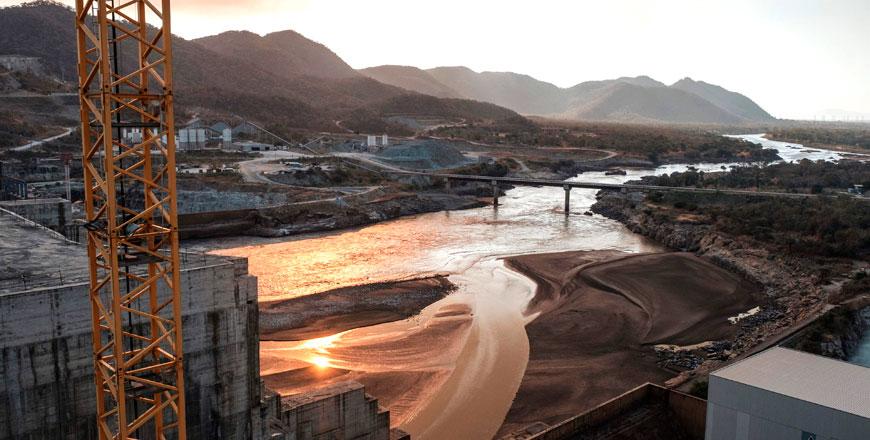You are here
Nile dam talks extended in Kinshasa after draft communique setback
By AFP - Apr 07,2021 - Last updated at Apr 07,2021

This photo shows Ethiopia’s Grand Renaissance Dam (AFP photo)
KINSHASA — Talks gathering Egypt, Ethiopia and Sudan on Addis Ababa's contested dam on the Nile were being extended on Tuesday after Sudan objected to the terms of a draft communique, a Congolese mediator said.
Hosted by the Democratic Republic of Congo (DRC) in Kinshasa, the meeting bringing together foreign ministers from the three countries began on Sunday and had been scheduled to end on Monday.
"Ethiopia and Egypt accepted the terms contained in the draft final communique. But Sudan felt that its interests in the River Nile were at threat," said the DRC source, who spoke on condition of anonymity.
Talks resumed on Tuesday aimed at finding common ground, the source said.
The long-running dispute centres on the Grand Ethiopian Renaissance Dam (GERD), a huge hydro-electric project across the Blue Nile.
Upstream Ethiopia says power produced by the GERD will be vital to meet the development needs of its 110 million people.
But the two countries downstream fear their lifeline could be threatened.
The talks are being hosted by DRC President Felix Tshisekedi, who became chairman of the African Union (AU) in February.
The US ambassador in Kinshasa, Mike Hammer, is also attending, and met during the night on Monday with the delegation chiefs of the three countries.
Their three-hour meeting took place in a room in the hotel hosting the talks.
“This communique will determine whether the meeting in Kinshasa is a success or a failure,” the Congolese negotiator said.
“This is why the heads of delegation want to give prior approval to its contents — their respective governments will be bound by it in the future.”
The GERD, whose planned capacity of 6,500 megawatts will make it the biggest dam in Africa, has been a source of tension since its first stone was laid in April 2011.
Downstream countries are especially worried about operations to fill the vast proposed lake behind the dam.
Egypt, which depends on the Nile for about 97 per cent of its irrigation and drinking water, has warned of an existential threat.
Sudan fears its own dams will be compromised if Ethiopia proceeds with filling the GERD before a deal is reached.
Egypt has sounded loud warnings to coincide with the Kinshasa meeting.
Its foreign minister, Sameh Shoukry, told Egyptian media that the negotiations represented “the last chance... to reach an accord”.
President Abdel Fattah Al Sisi separately declared: “Nobody will be permitted to take a single drop of Egypt’s water, otherwise the region will fall into unimaginable instability.”
Related Articles
KHARTOUM — Sudan, Egypt and Ethiopia agreed on Sunday to hold further talks this month to resolve their long-running dispute over the latter
ADDIS ABABA — Ethiopia said Saturday it was on schedule to begin filling a controversial mega-dam on the Blue Nile River within weeks but vo
KHARTOUM— Sudan warned on Sunday it cannot continue the "vicious cycle" of negotiations with Egypt and Ethiopia in the long-running dispute


















